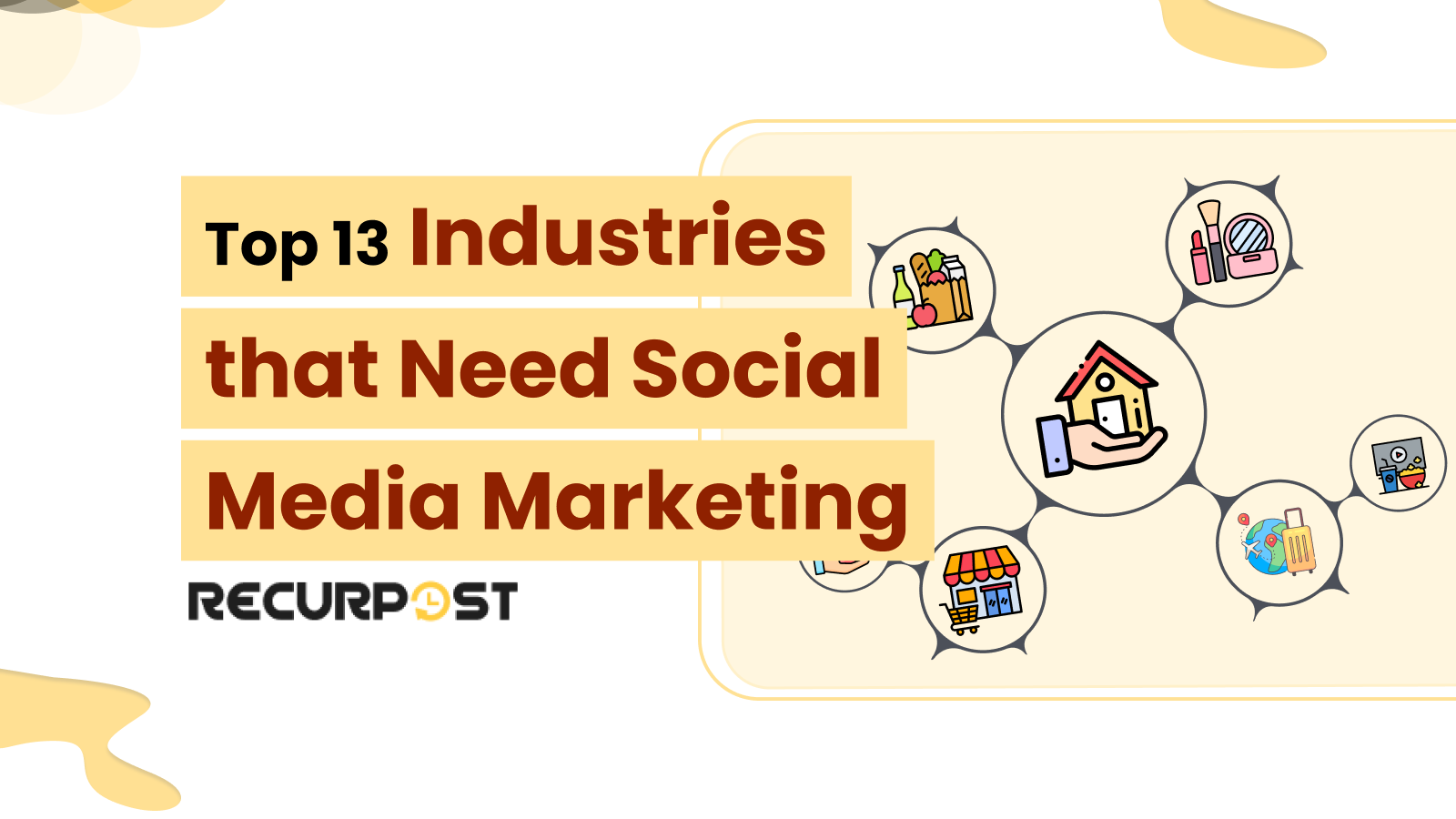Social media marketing for different industries connects small businesses with diverse audiences, builds brand awareness, and drives sales. However, marketing techniques change from one industry to another. Each industry requires specific social media marketing for businesses because of distinct characteristics, target audiences, rules and regulations, and market dynamics.
Retail companies require different approaches than education institutions, and social media marketing for small businesses, especially fashion brands, uses different tactics than healthcare providers. Understanding how can social media help business grow is essential, marketing for businesses in various industries works through unique and engaging social media campaigns that increase conversions, profits, and accelerate ROI.
Key factors for agencies, managers, and marketers to align client goals with campaigns include:
- Audience Analysis: Analyzing target audience behavior (i.e., preferences and requirements) for each industry.
- Content Strategy: Identifying the type of content that appeals to each industry’s audience.
- Platform Selection: Befitting platforms for a client’s industry.
- Competitive Analysis: Investigating industry-specific challenges, opportunities, and competitions.
- Regulatory Standards: Fostering an ethical culture in the workforce to ensure customer safety.
- Innovation: Learning the latest industry-specific trends, innovations, technologies, and strategies.
- Credibility Building: Gaining expertise to build credibility among existing, new and potential clients.
Companies across industries use social media marketing for active social listening, pattern analysis, market research, and performance analytics.
Industries use social media differently – fashion and retail focus on visual appeal, healthcare builds trust, while entertainment creates interactive content.
Leading Industries Practicing Social Media Marketing
Selecting appropriate social media platforms enables businesses to effectively reach and engage target audiences. Real estate marketing companies, healthcare brands, fashion retailers, and technology firms lead this transformation.
Matching social media strategies to specific industries creates new growth opportunities.
Learn How Social Media Affects Businesses
1. Real Estate
Ideal Platforms: Facebook, YouTube, Instagram, LinkedIn, TikTok

The National Association of Realtors survey revealed 92%, 68%, 52%, and 26% of real estate professionals promote property listings on Facebook, Instagram, LinkedIn, and YouTube, demonstrating social media marketing’s major role in real estate.
Realtors, contractors, builders, brokers, dealers, and agents leverage social media platforms for market presence, property advertisement, audience reach through property management, and sharing updates and news. Planning social media marketing for real estate involves:
- Each real estate sector (residential, industrial, commercial) has unique audiences, lease formats, requirements, and sales patterns, requiring tailored marketing approaches.
- Real estate businesses engage customers by sharing market insights, investment ideas, house-hunting tips, contract knowledge, and wealth management information.
- Uploading visually appealing videos and images in online community groups and real estate applications allows property owners to reach relevant crowds and avert the middle person from the equation, directly getting in touch with prospective buyers and tenants. Real estate businesses exhibit client testimonials on top social networks to attract new clients and advertise success stories.
- Visual platforms capture audience attention while cross-platform marketing drives website traffic, generates leads, and attracts buyers to open houses and showings.
- Real estate professionals use AI technology (Metaverse, AR/VR) as a USP to attract elite clients with virtually designed properties.
- Schedule property listings across platforms while using recurring libraries to maintain evergreen neighborhood guides and market updates. The visual content calendar helps align open house announcements with peak engagement times.
Example: Brookfield Asset Management is a prominent multinational Canadian corporation. The company shows expertise in real estate, renewable energy, and infrastructure by successfully communicating and educating its audience through articles, visuals, and videos on platforms like LinkedIn, Twitter(X), and YouTube.
Check Out Real estate social media marketing strategy
2. Beauty & Fashion
Ideal Platform: Instagram, Facebook, TikTok, Pinterest, Snapchat

Beauty and fashion sectors depend on social media marketing because of their highly visual products. Social marketing for these businesses builds brand awareness, consumer loyalty, platform traffic, branding, audience reach, and delivers targeted ads.
Statista projects these industries will earn $14.68 billion and $646.2 billion in 2024. Esteemed names in these sectors include Prada, Louis Vuitton, L’Oreal, Lakme, M.A.C, Versace, and Jimmy Choo.
Brands leverage social media marketing through these approaches:
- Beauty and fashion brands target audience segments by age, race, location, lifestyle, religion, mindset, and trends through appropriate platforms.
- Businesses showcase products through high-quality visuals, including professional shoots, ads, videos, images, and behind-the-scenes footage.
- Fashion and beauty businesses reach global customers through cross-platform marketing via email, social media, blogs, TV ads, and online advertising.
- Social media platforms showcase collaborations with complementary, non-competing companies, one of the essential marketing tips for maximizing reach. These partnerships help brands create content that resonates with multiple audience segments simultaneously. Influencer marketing, partnerships, and paid collaborations enable cross-pollination between brands. The social media advertising market will surpass $255.8 billion by 2028.
- Businesses share updates about offers, new products, trends, seasonal items, and limited editions through targeted marketing. Both growing companies and established businesses launching new ventures benefit from an online presence.
- Businesses engage audiences through UGC, giveaways, contests, live sessions, and other interactive content. Learning how to promote your business on social media for free through these engagement tactics can be particularly valuable for new brands with limited marketing budgets. Product information and beauty tips help brands connect with audiences, enhancing engagement and social commerce.
- Influencer content enhances brand engagement significantly. Sponsored influencer content outperforms organic posts in effectiveness. Brands create educational and entertaining material that resonates with audiences by integrating influencer content.
- Organize content by seasonal collections in separate libraries, schedule product launches across multiple platforms simultaneously, and analyze which visual content drives the most engagement.
Example: One of the most effective social media marketing examples is Fenty Beauty , since its launch it has gathered applause and is now dominating the beauty industry because of its inclusivity and diversity. The brand uses models and influencers from different backgrounds to ensure everyone (i.e., its target audience) feels represented. Fenty Beauty is active on Instagram, Twitter(X), and Facebook, frequently showing real people using its products.
3. Retail
Ideal Platform: Facebook, Instagram, Twitter, Reddit, YouTube

American retail marketplace sales will reach $603.2 billion by 2027, using integrated offline and online marketing. Social media marketing connects retailers with global customers, adding value and convenience to shopping experiences. Retailers connect with target audiences across multiple locations through these approaches:
- Small and medium-sized retailers use social media to reach markets and build brand awareness. Online marketing drives promotions, sales, advertisements, leads, and customer acquisition.
- Audience demographics and product type determine the best social media platforms. Food chains and fashion retailers excel on Facebook and Instagram, while electronic retailers perform better on YouTube and Reddit.
- Retail businesses use AI-powered marketing for content creation, customer support, predictive analysis, reporting, and competitive advantage.
- Retail and other customer-centric industries rely on AI-powered hyper-personalization. AI creates seamless synchronization between offline and online shopping activities, a practice many brands have adopted.
- Manage time-sensitive promotions with bulk scheduling, create separate libraries for different product categories, and maintain consistent posting during high-traffic shopping seasons.
Example: IKEA is a renowned offline and digital marketing genius because of its out-of-the-box ideas. The company’s multifaceted marketing brings together YouTube, Facebook, Instagram, and Twitter(X) for a cohesive online and offline brand presence.
4. Tourism & Hospitality
Ideal Platform: Instagram, Facebook, GBP, YouTube, TripAdvisor

Social media marketing provides essential solutions for the tourism industry. Forbes reports that 82% of travelers prefer digital research and booking. Tourism and hospitality marketing campaigns need tailored approaches rather than generic solutions. Insights and engaging content increase conversion rates.
Strategies to build audience relationships include:
- Different channels enable varied marketing approaches. Each channel delivers information in formats users prefer. Visual platforms showcase images and videos, while text-based platforms provide detailed information. Integrate platforms and diversify content formats.
- Social media marketing for the travel industry attracts audiences through captivating destination stories, experiences, and customer journeys. Align social calendars with seasonal destination guides for greater impact and relevance.
- Hospitality and tourism marketing focuses on guest experiences, local attractions, travel tips, and destination guides to inspire visitors.
- Travelers contact businesses for inquiries, feedback, help and concerns. AI-generated real-time assistance builds trust and loyalty. UGC and behind-the-scenes content humanize businesses.
- Deliver unique, detailed information through engaging content. Share optimal visit times, travel tips, safety advice, accommodation recommendations, and local cuisine options. Schedule destination highlights during peak booking periods, maintain libraries of seasonal travel guides, and track engagement to understand which destinations generate the most interest.
- Highlight your USP and special features in content. This approach helps businesses stand out and attract audiences seeking tailored experiences. Examples of tourism include heritage tours, solo travel, biker groups, female-only trips, pet-friendly vacations, and adventure excursions. In hospitality, USPs entail homestays, wellness retreats, culinary excellence, themed properties, and luxury hotels.
Example: The Icehotel in Sweden is the world’s first hotel built out of ice and snow. The hotel rebuilds every winter and offers a unique experience with special room designs, a winter menu, an ice sculpture museum, an ice bar, etc. It actively promotes its exclusive services on Instagram, Twitter(X), and YouTube.
5. Food & Beverage
Ideal Platform: Instagram, Facebook, TikTok, YouTube, Yelp

Social media has transformed the food and beverage industry. Consumers now access food science and industry information directly. Consumers can instantly explore global cuisine and discover new restaurant openings.
The International Food Information Council(IFIC) predicts that social media will influence the snacking and cooking trends in 2024. Social media marketing for restaurants and other food and beverage businesses can optimize these strategies for a strong impact.
- Create comprehensive content showing behind-the-scenes shots, decor, staff, directions, operations, and skills that inform customers about your business.
- Experiment with marketing techniques to find what works best. Demonstrate USPs like robot servers, distinct cooking methods, smart ordering, solo dining options, or pet-friendly policies to attract new guests.
- Food establishments share visuals of dishes and ambiance to attract customers. Promoting seasonal menus, special offers, and discounts coupons is one effective method in food marketing strategy to converts customers into regulars.
- Generate excitement with limited-time offers, happy hours, discounts, and special events. Announce collaborations with influencers and businesses on your most engaging platforms. Partnership content expands audience reach and builds credibility.
- Humanize social media for organic reach and word-of-mouth publicity. Include testimonial videos, request reviews from loyal guests, and share UGC to demonstrate customer focus.
- Social media significantly influences snacking and cooking trends. Instagram and TikTok showcase viral recipes and snack ideas, driving consumer trends. Integrating trending items into menus attracts broader audiences and maintains relevance. Organize content by meal types or special offers, schedule posts to align with dining hours, and maintain libraries of menu items and customer favorites.
Example: One of the effective social media marketing for small business examples is Curry Corner, an Indian eatery and bar in Minneapolis, greets on-goers with free-tasting items. Their interaction videos with prospective guests have gone viral on Instagram, getting more attention and business.
Use Facebook for Restaurants in the Best Possible Ways
6. Healthcare
Ideal Platform: Facebook, LinkedIn, YouTube, WhatsApp, Twitter

The COVID pandemic pushed the healthcare industry to adopt social media platforms to enhance global communication, professional networks, and healthy practices. Millennials and Gen Z prioritize health more than previous generations, with digital platforms providing immediate information. Healthcare social media marketing is now essential. Strategic social media marketing expands healthcare’s online reach.
- Booking features enable appointment scheduling and basic inquiry resolution without human interaction. Use videos, images, blogs, and infographics to share valuable healthcare insights.
- Social media optimization benefits doctors, hospitals, pharmacies, and medical professionals. Medical organizations can share values, mission, and services across platforms to build brand identity.
- Social media platforms efficiently distribute medical updates, education, and awareness information. Content includes medicine news, precautionary tips, illness information, and patient stories.
- Healthcare organizations conduct online sessions to share plans, investments, and goals. Medical organizations host live Q&A sessions open to all participants.
- Healthcare organizations showcase company culture on LinkedIn to highlight values that resonate with employees and clients. Building a trusted brand requires healthcare professionals to maintain an authentic social media presence.
- Maintain separate libraries for health tips, service announcements, and educational content while ensuring consistent posting schedules that respect industry regulations.
Example: WHO is constantly active on YouTube, Twitter, Instagram, and Facebook. The organization has subdivisions in many countries to deliver relevant information and resolve medical issues. Their omnichannel presence allows them to reach almost every generation, making them a role model in healthcare social media marketing.
7. Entertainment
Ideal Platform: Instagram, Facebook, YouTube, TikTok

Entertainment marketing increases visibility and engagement across 5 billion global social media users. Social media removes language, country, and genre barriers for entertainment content. Strategic optimization amplifies entertainment business results.
- Hype creation drives entertainment marketing success. Strategic platform and content choices create market momentum. Exclusive previews, snippets, teasers, and BTS content initiate audience conversations. Coordinate release announcements across platforms, schedule promotional content leading up to events, and analyze audience engagement with different types of content.
- Live sessions, virtual meet-and-greets, and quizzes boost social media positioning. Online interviews with crew members heighten viewer engagement.
- Share insider details. Personal stories, experiences, and project details create stronger audience connections.
- Create unique project announcements to drive viewer excitement. To illustrate, ask industry colleagues to advertise and promote your upcoming project, include the audience as part of your publicity strategy, and plan cliffhangers.
- Event promotion and collaboration are a piece of cake with social media marketing platforms. Digital platforms have the power to bring together talented people and make the most out of it. For instance, Bill Gates collaborated with Eitan Bernath for a cooking session.
Example: Marvel Studio is one of the best practices of social media marketing in the entertainment industry. The company syncs Instagram, Twitter(X), Facebook, YouTube, and TikTok for offline and online marketing strategies. They cleverly plan BTS, launch dates, trailers and teasers, live sessions, meet-and-greets, interactive content, influencer partnerships, cross-promotion, sponsored content, etc., for optimal results.
8. NGO / Non-Profit Organizations
Ideal Platforms: Facebook, Instagram, Twitter (X), LinkedIn, YouTube
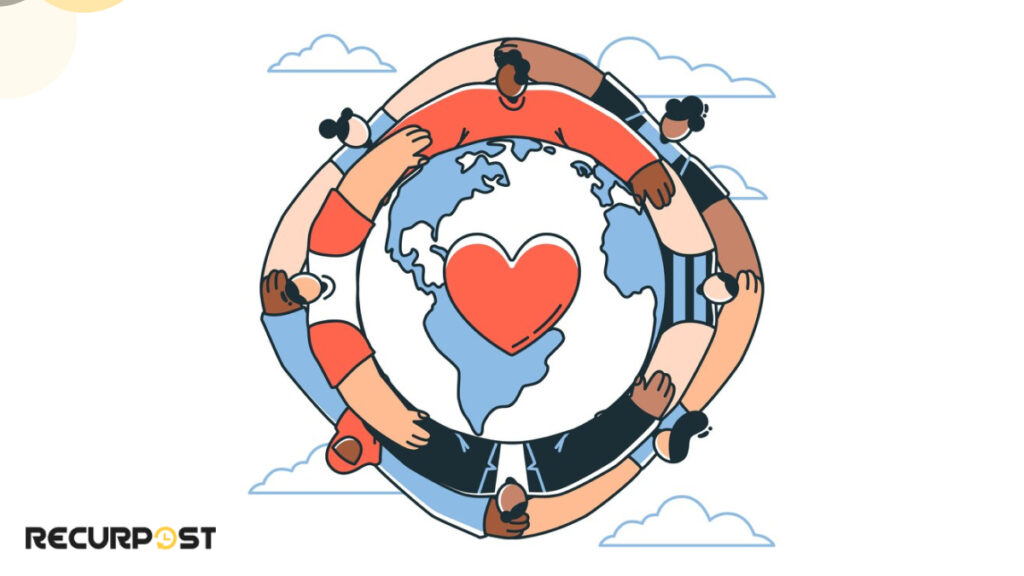
Non-profit organizations use social media to produce trust, engage supporters, and collect contributions. The UN Development Programme constantly pushes nonprofits to enhance their social media presence. A well-curated social media strategy for NGOs mainly focuses on narratives, effective updates, and community interactions to encourage meaningful conversations.
- The first step of how to promote an NGO on social media is choosing the right digital platforms to reach donors as well as volunteers. Even with social media marketing small budgets can achieve significant impact when platforms are strategically selected. For visual storytelling, you can choose Facebook and Instagram. LinkedIn is the perfect place for professional partnerships and outreach.
- NGOs and nonprofits can conduct live sessions and Q&As to connect emotionally with supporters. They can post mission-driven content, share impactful stories, and support-generated content to ensure transparency.
- Today, social media marketing for NGOs is one of the first strategies to spread awareness, drive donations, and inspire society. Nonprofits can also share behind-the-scenes celebratory moments in order to deepen the community’s trust and welcome long-term supporters.
Example: UNICEF is a leading example of social media marketing for NGOs. It constantly shares its ongoing worldwide campaigns on Instagram, Facebook, Twitter (X), and YouTube, showcasing how to promote an NGO on social media with a powerful impact.
9. Music
Ideal Platforms: Instagram, YouTube, TikTok, Facebook, Twitter (X), Spotify
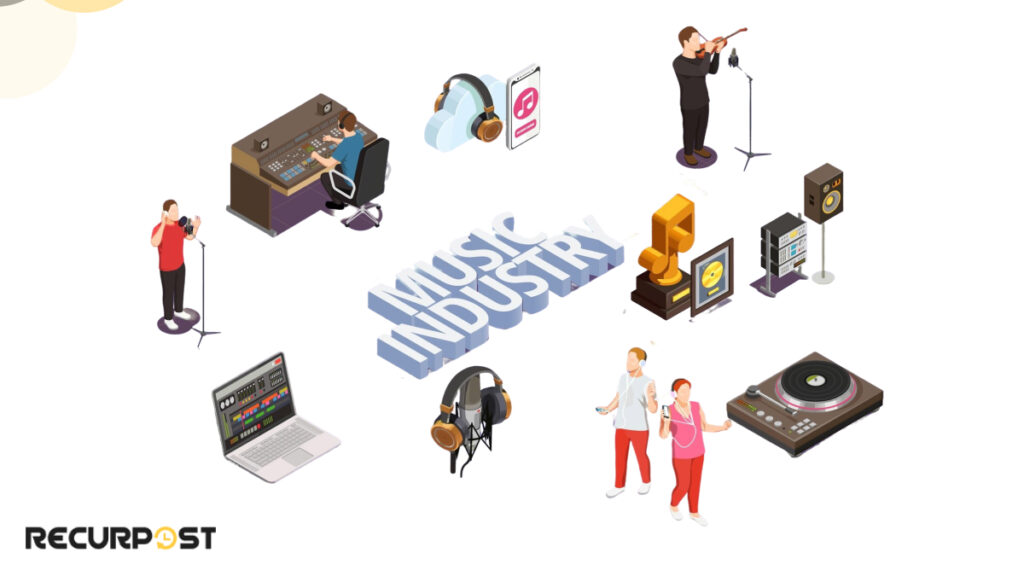
Global recorded music revenue increased for the 10th year in a row in 2024, with US$29.6 billion, indicating a clear sign of growth in digital engagement. The music industry flourishes on visibility, hype, and direct fan connection Social media platforms provide all of it! Hence, social media for musicians is an ideal place to expose their talent.
- A focused social media strategy can drive optimal attention and growth for labels launching albums, producers sharing teasers of new beats, and music festival announcements.
- Social media marketing for music artists helps in boosting visibility, streaming numbers, and fan loyalty. The short-form content on TikTok and Instagram helps in discovering new music or repurposing old pieces. On the other hand, YouTube and Spotify help audiences in creating a personalized journey.
- Any social network for musicians is an ideal place to create a personal brand. SoundCloud and Bandcamp are strong social networks for musicians to showcase and promote their art.
Example: Coachella leverages viral content, live updates, and fan engagement for multi-platform marketing across platforms like Instagram, TikTok, YouTube, Facebook, and Twitter (X).
10. Photography
Ideal Platforms: Instagram, Pinterest, Facebook, Behance, 500px

Social media becomes a gallery and a marketing engine for photographers. A strategic social media strategy for photographers helps gain clients, showcase signature styles, and form recognition.
- Social media for photographers delivers optimal results when compelling visuals, storytelling, and BTS content are planned carefully for the target audience.
- Instagram and Pinterest are primary choices for anyone who wants to share social media photography. Behance and 500px are just the spaces where social networks for photographers work like magic to display their work and connect with like-minded people.
- Incorporate targeted hashtags, aesthetic uniformity, and detailed captions to optimize a photographer’s social media profiles. This approach can drive engagement and professional growth for aspiring photographers.
Example: Brandon Woelfel, re renowned portrait photographer, educates on Instagram and YouTube about his dreamy edits, creative shoots, and tutorials. This marketing technique helps him grow his brand through authentic and visually strong content.
11. eCommerce
Ideal Platforms: Instagram, Facebook, TikTok, Pinterest, YouTube
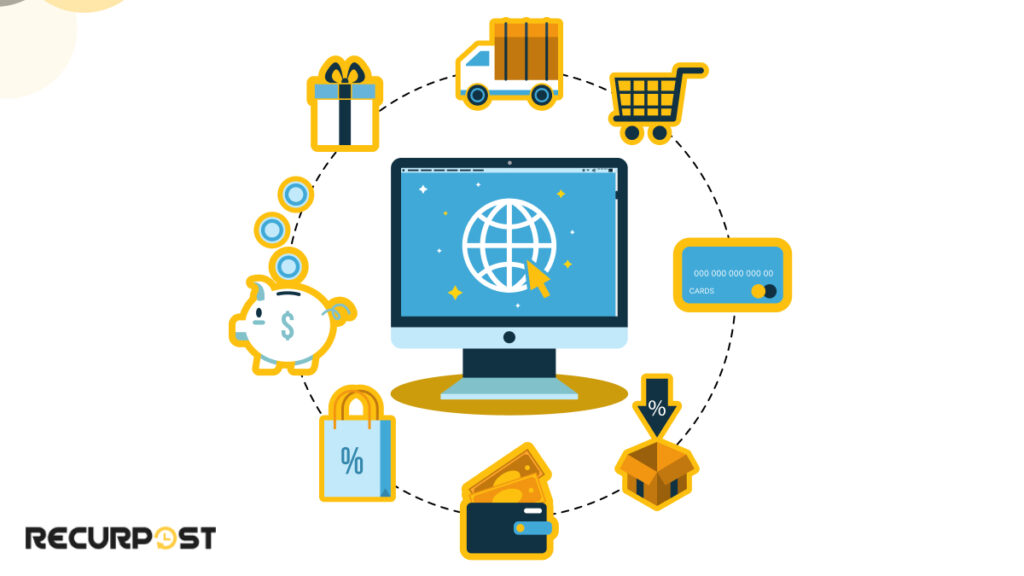
The e-commerce industry thrives on online visibility and engagement. An out-of-the-box eCommerce social media marketing is crucial to drive traffic, boost conversions, and build brand loyalty. Most of the segments of the global eCommerce market will grow steadily through 2029, including some ups and downs.
- Social media eCommerce campaign strategies, such as shoppable posts on Instagram and Facebook, help users in buying. TikTok is an ideal choice for viral product video content. Pinterest provides a visual discovery, becoming a perfect platform to showcase products and enable a seamless customer journey.
- Brands can easily build trust and reach a wider audience with the help of user-generated content, influencer partnerships, and targeted ads. Numerous establishments have started integrating AI-powered chatbots and personalization interactions to enhance customer satisfaction and engagement as a part of social media marketing strategies for e-commerce.
- The primary role of social media marketing strategies for e-commerce is to make the most of e-commerce social media profiles. Hence, consistent branding, direct purchase links, and product-rich content become essential.
Example: Glossier, a digital-first brand, optimizes Instagram and TikTok to share UGC, product tips, and brand stories, turning followers into loyal customers and boosting online sales.
12. Sports
Ideal Platforms: Instagram, Twitter (X), YouTube, TikTok, Facebook

Social media in sports has completely changed the way fans connect with athletes, teams, and events. Sports entities actively come up with unique sports content ideas with the use of fan data analytics to personalized experiences and boost revenue. Consequently, this new approach has reshaped engagement across the industry, says Deloitte’s 2024 Sports Industry Outlook.
- Social media marketing for athletes can be a game-changer. It can help to build a personal brand, establish and grab sponsorships, and maintain relationships with followers. On the other hand, clubs and leagues leverage social media marketing for sports teams to sell tickets, promote merchandise, and create communities.
- Social media marketing for sport makes every moment, such as games, training sessions, and BTS, worthy of shareable content. From engagement to monetization, social platforms are now integral to sports branding.
- Match-day highlights, athlete takeovers, training snippets, live Q&As, fan polls, etc., are some of the creative content ideas to generate excitement and expand reach across platforms.
Example: FC Barcelona is globally one of the most-followed sports accounts. It heightens the engagement and brand loyalty among fans by sharing behind-the-scenes content, match recaps, and fan-driven campaigns using Instagram, TikTok, and YouTube.
13. Financial Services
Ideal Platforms: LinkedIn, Twitter (X), Facebook, YouTube, Instagram
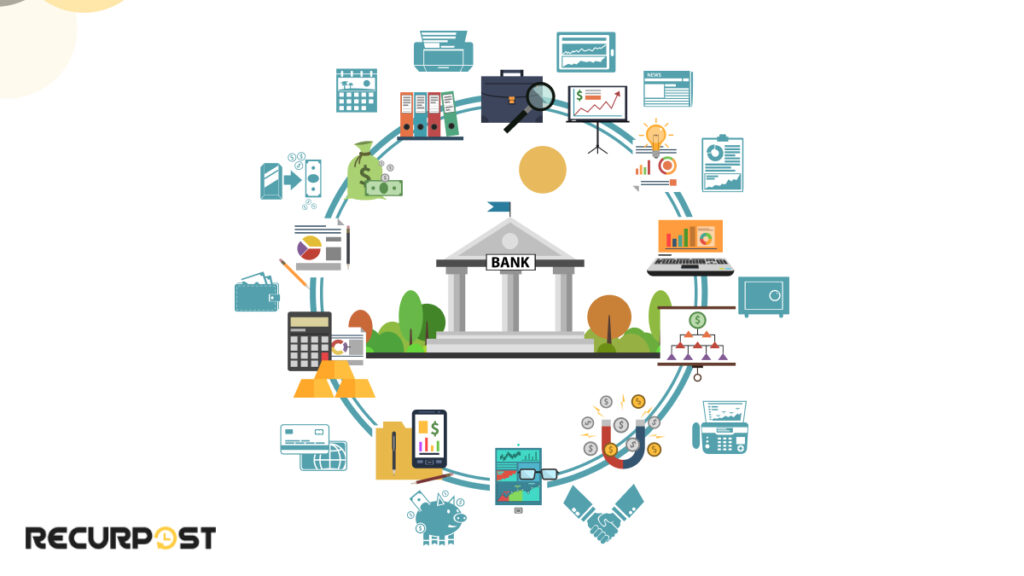
Social media for financial services is evolving from a compliance-heavy space into a powerful channel for trust, education, and lead generation. Financial brands now use social platforms to simplify complex topics, build authority, and connect with audiences in real-time. According to Forbes, promoting financial services online is both highly regulated and highly rewarding.
- For an effective financial services social media strategy, you can post market insights, tips on money management, regulatory updates, and client success stories.
- LinkedIn and Twitter/X are social media platforms to showcase thought leadership and professional engagement. Instagram and YouTube are perfect for explainers and storytelling.
- Social media for financial professionals acts as a supportive tool to establish credibility, showcase expertise, and build one-on-one client relationships, especially if it’s for advisors, planners, and consultants.
- Leverage social media reporting for financial services to track performance simultaneously and stay complaint. Clear analytics help optimize content, understand audience behavior, and maintain transparency.
Example: Morgan Stanley uses LinkedIn and Twitter/X to publish investment trends, educational videos, and expert commentary, positioning itself as a trusted voice in the global financial industry.
How To Implement Social Media Strategy in Any Industry?
Companies use social media marketing through straightforward, strategic approaches. However, we have enlisted step-by-step information to ensure you have a smooth workflow while preparing an industry-specific social media strategy for your business. Some who want to start a career in social media marketing can follow these steps.
Step 1: Set a Clear Goal: The first element in any social media marketing for small business template is to decide the main goals for marketing your business on social media.
Step 2: Filter Target Audience: Conduct in-depth research on your targeted demographics and psychographics to develop a comprehensive marketing plan and targeted social media strategy.
Step 3: Identify Lucrative Platforms: Suitable social media platforms to align the demands of the targeted industry and audience.
Step 4: Strategic Content Creation: Produce creative, relevant, and diversified social media post ideas to make a distinct place in the market.
Step 5: Survey & Modify: Employ analytics tools to navigate social marketing progress and amend required strategies in real-time.
Achieving the best results in social media marketing requires careful planning, execution, and continuous optimization. Customer feedback and social media engagement provide actionable insights that refine social media strategies. These insights help in making informed decisions and driving growth within your industry.
Use RecurPost for Social Media Marketing for Different Industries
RecurPost, our Social Media Management Tool, is capable of handling complex social posting with automation and helps you control cross-platform activities at one stop. It allows you to efficiently manage multiple social media accounts, ensuring effective engagement with your audience.
Our centralized system inspires you to experiment on different social media platforms and get out of a slump of ideas. Compared to Sprout Social, RecurPost offers a more comprehensive suite of features tailored for automation and evergreen content management.
Key features:
- Support for all major social networks
- Centralized control
- Multiple workspace management
- RSS feeds
- White label reporting
- AI-support
- Recurring libraries for evergreen content
To Sum Up
Industries need specific 2025 social media marketing approaches aligned with their characteristics, audiences, and market dynamics. Social media enhances customer engagement and service as brands adapt strategies to meet digital-age consumer expectations. Industry-specific social media posts connect businesses with individuals and build trust, while measurement insights drive improvement. Companies thrive by evolving digital strategies and advancing social media efforts.
Social media marketing drives growth across industries by building brand awareness, engaging customers, increasing revenue, and creating a competitive advantage in the current market.
Each industry needs customized approaches for its specific needs and target audiences. Incorporating paid social media management amplifies reach, connects businesses with customers effectively, and enhances marketing strategies while adapting to industry trends.
Frequently Asked Questions
1) Which industries are the most appropriate for social media marketing?
Travel, health-wellness, fashion, beauty, education, recruitment, real estate, and entertainment are some of the prime industries taking advantage of social marketing.
2) How does social media marketing impact an industry?
Targeted social media marketing platforms influence customer relationships, business turnover, and business performance.
3) Which industry benefits the most from social media marketing services?
The entertainment industry benefits the most from social media marketing services.
4) How can real estate professionals use social media effectively?
The real estate industry frequently uses Facebook and Instagram for property advertisement, direct interactions, and customer engagement with prospective buyers.
5) Why is audience understanding important in social media marketing?
Understanding the target audience (i.e., preferences and requirements) is vital for designing compelling campaigns.

Ruchi Dhimar is a skilled content writer with 4 years of experience. She is passionate about crafting compelling narratives, specializing in writing content for different industries.
